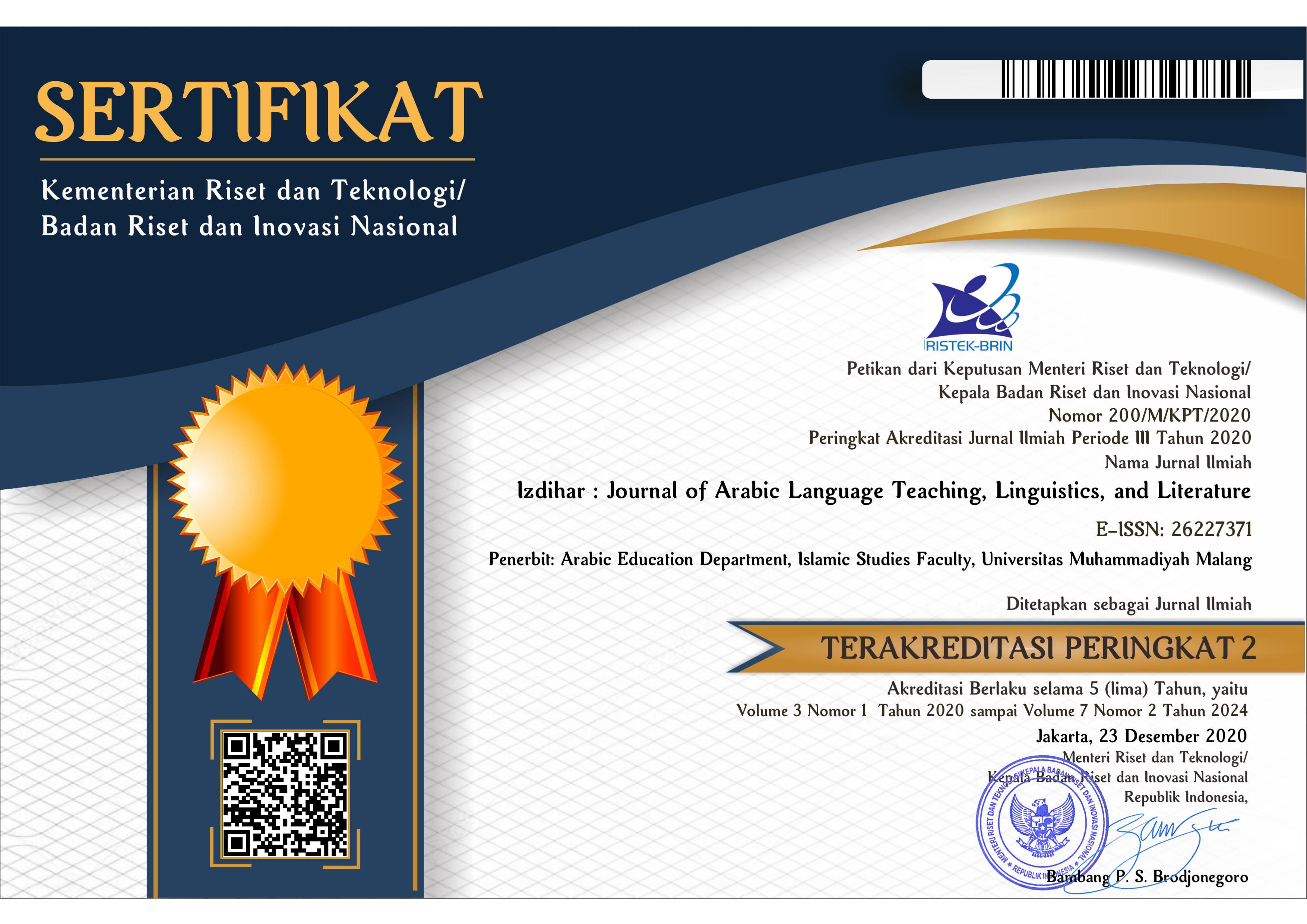Content Validity to Assess the LMS-Moodle-based Academic Writing Learning Model of Arabic
DOI:
https://doi.org/10.22219/jiz.v5i2.21542Keywords:
Academic Writing, Arabic, Content Validity, LMS-Moodle-basedAbstract
The aim of study was a deep understanding of the description of content validity of a LMS-Moodle Based to support learning Arabic academic writing. This research focused on tracing LMS that are suitable to be used to carry out Arabic academic writing learning in college. This study used a Research and Development method that combines two research methods to describe the validation mechanism of the LMS-Moodle Based device for learning of Arabic writing. To develop this research instrument, the researchers developed an instrument based on the IPA Matrix analysis. After developing the instrument, LMS assessment was carried out by several experts in the field of learning media who assessed the LMS used in learning Arabic academic writing. The results of this study indicated that the LMS used for learning Arabic academic writing is feasible to use based on the measurement of the matrix science.
Downloads
References
Abdillah, J. (2022). An analysis of electronic services quality in intellectual property using gap analysis and Importance Performance Analysis (IPA) as public service quality improvements. Jurnal Ilmiah Kebijakan Hukum, 16(1), 153–174. https://doi.org/10.30641/KEBIJAKAN.2022.V16.153-174
Abdul Hakim, M. K. (2018). Improving Arabic academic writing skills through contextual teaching and learning approach. ALSINATUNA, 3(2), 183-199. https://doi.org/10.28918/alsinatuna.v3i2.1169
Aggarwal, A. (1999). Web-based learning and teaching technologies: opportunities and challenges ... - Google Books. Idea Group Publisher. https://books.google.co.id/books?hl=en&lr=&id=qNt23VSM5OsC&oi=fnd&pg=PP1&dq=web+based+learning+concept&ots=zktbu3b-Ms&sig=FoWZZ-kHSsM-E3Q1DnCQnhMdjaY&redir_esc=y#v=onepage&q=web based learning concept&f=false
Amalia, R. N., & Fahmi, A. K. (2021). Pengaruh model pembelajaran blended learning terhadap minat belajar bahasa Arab siswa kelas XII SMK Al-Muhtadin Depok. Riyahuna: Jurnal Pendidikan Bahasa Arab, 1(1), 1–13. https://doi.org/10.22236/JPBA/117723
Andri, P., Jasfar, F., & Kristaung, R. (2022). Effect of product, distribution and service quality on customer loyalty through customer satisfaction at Indonesian marketplace. Devotion: Journal of Community Service, 3(4), 321–335. https://doi.org/10.36418/DEV.V3I4.122
Arfianto, A., Sutama, S., & Fathoni, A. (2022). Kelayakan buku lembar kerja peserta didik berbasis Problem Based Learning (PBL) pada pembelajaran tatap muka terbatas di sekolah dasar. Jurnal Basicedu, 6(1), 656–663. https://doi.org/10.31004/BASICEDU.V6I1.1985
Arifa, Z., Faruq, U. Al, Hizbullah, N., & Hassan, H. (2022). The dynamic of Arabic academic writing in postgraduate program: Linguistic corpus analysis. Ijaz Arabi Journal of Arabic Learning, 5(1), 72-89. https://doi.org/10.18860/IJAZARABI.V5I1.13251
Bai, H., & Bai, H. (2022). Students’ use of learning management system in hybrid learning: Mobile or not. International Journal on E-Learning, 21(1), 5–23. https://www.learntechlib.org/primary/p/219505/
Bailey, S. (2006). Academic writing a handbook for international students. Routledge. Taylor and Francis Group.
Dobre, I. (2015). Learning management systems for higher education - an overview of available options for higher education organizations. Procedia - Social and Behavioral Sciences, 180, 313–320. https://doi.org/10.1016/J.SBSPRO.2015.02.122
Duin, A. H., & Tham, J. (2020). The current state of analytics: Implications for Learning Management System (LMS) use in writing pedagogy. Computers and Composition, 55, 102544. https://doi.org/10.1016/j.compcom.2020.102544
Fahmi, A. K., & Fahmi, A. K. (2016). Analisis kesalahan gramatikal teks terjemah (Indonesia-Arab) dalam pendidikan bahasa Arab. Kordinat | Jurnal Komunikasi Antar Perguruan Tinggi Agama Islam, 15(1), 105–116. https://doi.org/10.15408/kordinat.v15i1.6311
Fauzi, M. F., Murdiono, M., Anindiati, I., Nada, A. L. I., Khakim, R. R., Mauludiyah, L., & Thoifah, I. (2020). Developing Arabic language instructional content in Canvas LMS for the era and post Covid-19 pandemic. Izdihar : Journal of Arabic Language Teaching, Linguistics, and Literature, 3(3), 161–180. https://doi.org/10.22219/JIZ.V3I3.15017
Gumelar, G., & Ramadhany, V. (2020). Catatan editor: Penelitian dan pembelajaran di masa pandemi Covid-19, serta prosedur telaah teman- sejawat di JPPP. JPPP - Jurnal Penelitian dan Pengukuran Psikologi, 9(2), 50–53. https://doi.org/10.21009/JPPP.092.01
Hardyanto, R. H. (2017). Konsep internet of things pada pembelajaran berbasis web. Jurnal Dinamika Informatika, 6(1), 87–97.
Hikmat, A., & Solihati N. (2020). Penulisan akademik (1st ed.). Paedea.
Khuwaileh, A. A., & Al Shoumali, A. (2010). Writing errors: A study of the writing ability of arab learners of academic english and Arabic at university. Language, Culture and Curriculum, 13(2), 174–183. https://doi.org/10.1080/07908310008666597
Lee, J. D., Hacker, R. E., Meadan, H., & Haidar, B. S. (2022). Challenging behaviors online modules for parents of young children with disabilities: A pilot feasibility study. Education and Treatment of Children, 1–15. https://doi.org/10.1007/S43494-021-00067-X/FIGURES/3
Liza, F., Rachmawati, M., & Shahrour, A. (2021). Fun learning Arabic Speaking skills using kinemaster video. Izdihar : Journal of Arabic Language Teaching, Linguistics, and Literature, 4(3), 363–372. https://doi.org/10.22219/JIZ.V4I3.17851
Mahbubah, L., Sutaman, S., & Syuhadak, S. (2021). Strategy for writing scientific research among students in Department of Arabic. Izdihar : Journal of Arabic Language Teaching, Linguistics, and Literature, 4(1), 71–84. https://doi.org/10.22219/JIZ.V4I1.15840
Mckimm, J., Jollie, C., & Cantillon, P. (2003). ABC of learning and teaching Web based learning. www.ltsn.ac.uk
Mufidah, N., Isyaty, I., Kholis, N., & Bin Tahir, S. Z. (2019). ICT for Arabic learning: A blended learning in istima’ II. لسـانـنـا (LISANUNA): Jurnal Ilmu Bahasa Arab dan Pembelajarannya, 8(2), 314-323. https://doi.org/10.22373/ls.v8i2.4561
Oktariani, P. D., Suranata, K., & Dwiarwati, K. A. (2021). Kelayakan dan keefektifan sistem konseling behavioral teknik modeling dalam LMS Schoology untuk meningkatkan motivasi belajar siswa. SCHOULID: Indonesian Journal of School Counseling, 6(3), 224–238. https://doi.org/10.23916/08971011
Omari, S. El. (2015). The effect of computer-assisted language learning on improving Arabic as a Foreign Language (AFL) in higher education in the United States. Procedia - Social and Behavioral Sciences, 192, 621–628. https://doi.org/10.1016/j.sbspro.2015.06.109
Oster, C., Leibbrandt, R., Schoo, A., Lange, B., Litt, J., Morello, A., Antonello, C., Powers, D., Maeder, A., & Lawn, S. (2022). A feasibility study of teaching motivational interviewing in a fully online environment using a virtual client. 1–12. https://doi.org/10.1080/14635240.2022.2047095
Setiadi, S. (2017). Peningkatan keterampilan kitabah Arabiyah mahasiswa melalui metode tutor sebaya. Jurnal Al Bayan: Jurnal Jurusan Pendidikan Bahasa Arab, 9(1), 31-39. https://doi.org/10.24042/albayan.v9i1.1094
Sumardi, D., Suryani, N., & Musadad, A. A. (2021). Website-Based Learning Management System (LMS) as a tool for learning in the Covid-19 pandemic period for junior high schools. Journal of Education Technology, 5(3), 346–355. https://doi.org/10.23887/JET.V5I3.38371
Tananuraksakul, N. (2014). Use of facebook group as blended learning and learning management system in writing. Teaching English with Technology, 14(3), 3–15.
Trinh, T., Tran, T., & Nguyen, H. B. (2022). The effects of paraphrasing on EFL Students ’ academic writing. Journal of Language and Linguistic Studies, 18(1), 976–987. https://doi.org/10.52462/jlls.233
Wibisono, D. (2019). Analisis kualitas layanan pendidikan menggunakan matriks importance performance analysis di sekolah XYZ. Jurnal Optimasi Teknik Industri, 1(2), 14–20. http://dx.doi.org/10.30998/joti.v1i2.4099
Downloads
Published
How to Cite
Issue
Section
License
Copyright (c) 2022 Ari Khairurrijal Fahmi; Miatin Rachmawati; Kamal Surong; Izdihar : Journal of Arabic Language Teaching, Linguistics, and Literature

This work is licensed under a Creative Commons Attribution-ShareAlike 4.0 International License.
Copyright Notice
Authors who publish with this journal agree to the following terms:
- Authors retain copyright and grant the journal right of first publication with the work simultaneously licensed under a Creative Commons Attribution-ShareAlike 4.0 International License that allows others to share the work with an acknowledgment of the work's authorship and initial publication in this journal.
- Authors are able to enter into separate, additional contractual arrangements for the non-exclusive distribution of the journal's published version of the work (e.g., post it to an institutional repository or publish it in a book), with an acknowledgment of its initial publication in this journal.
- Authors are permitted and encouraged to post their work online (e.g., in institutional repositories or on their website) prior to and during the submission process, as it can lead to productive exchanges, as well as earlier and greater citation of published work (See The Effect of Open Access).
Copyright (c) 2019 Izdihar : Journal of Arabic Language Teaching, Linguistics, and Literature

This work is licensed under a Creative Commons Attribution-ShareAlike 4.0 International License.

















